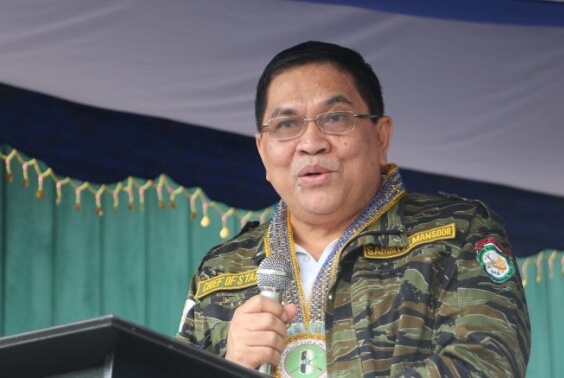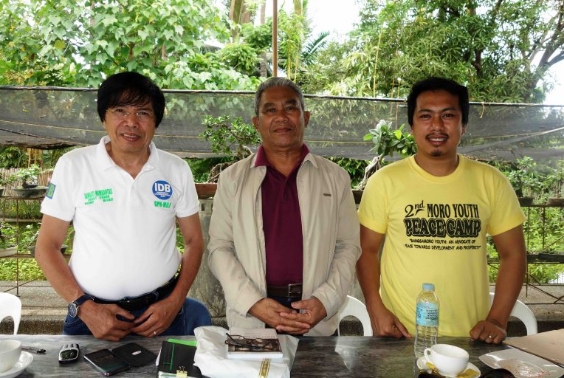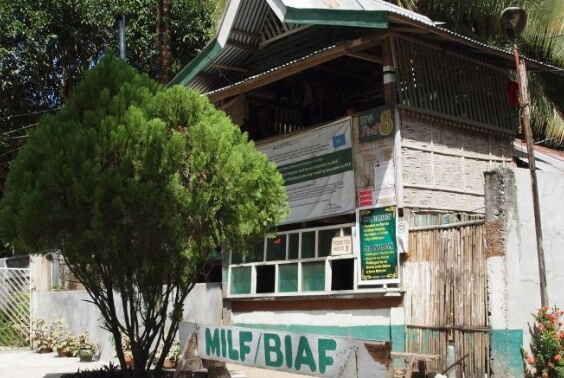- SOUTHERN PHILIPPINES
Japan’s Contribution to the Mindanao Peace and Development: Views from the Ground
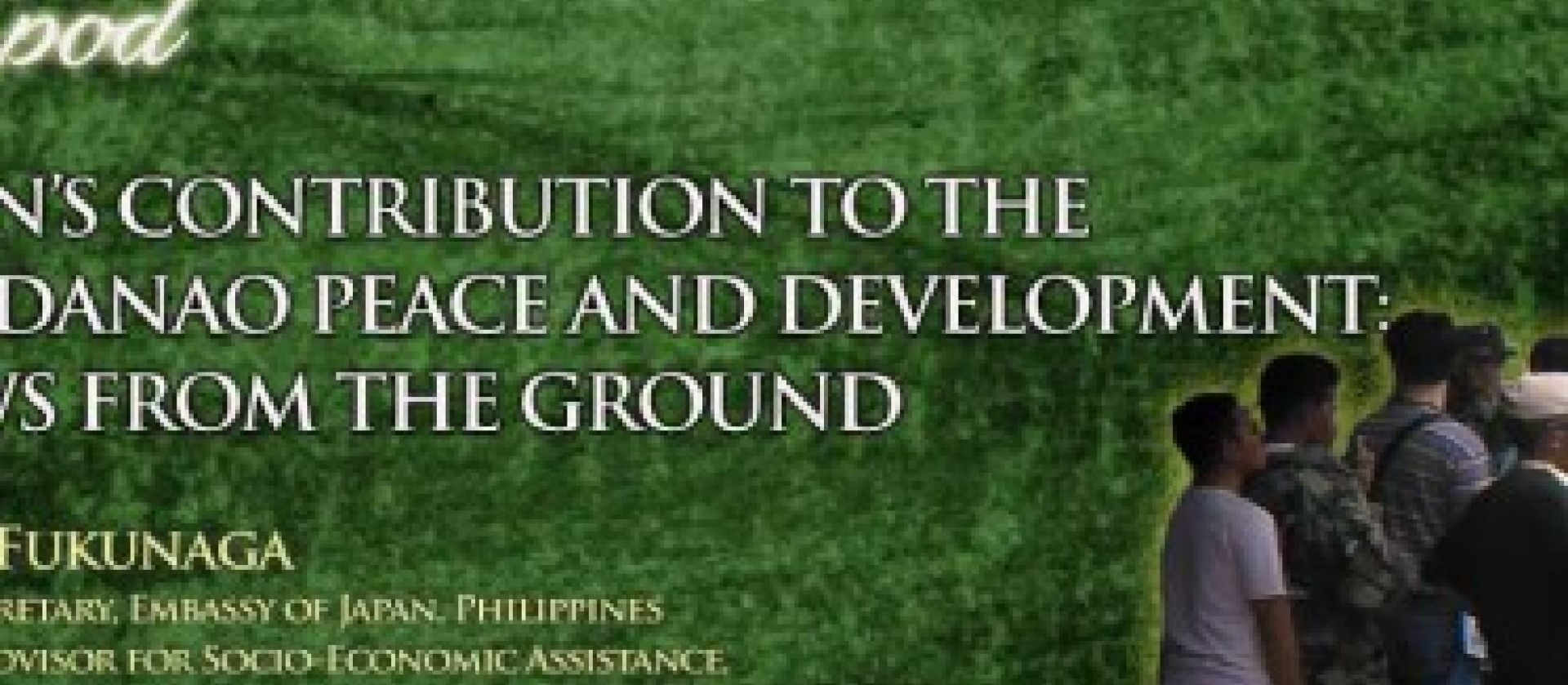
At the Malacañang Palace in Manila, the capital of the Philippines, on the afternoon of October 15, 2012, the Government of the Philippines and the Moro Islamic Liberation Front (MILF) signed the Framework Agreement on the Bangsamoro (FAB). The historical signing ceremony was reported widely in the local press in the Philippines as well as in the Western media. The Japanese media also reported some aspects of Japan’s contribution to the conflict area in Mindanao, but as one of the Japanese involved on the ground, I would like to briefly introduce what Japan is doing.
After the FAB was signed the Japanese government immediate issued a statement by the foreign minister to express that Japan welcomes the agreement and that it will continue to support the efforts toward peace and development in Mindanao. In fact, Japanese support toward Mindanao started after the then-Prime Minister Shinzo Abe announced the launch of the “Japan–Bangsamoro Initiatives for Reconstruction and Development” (J-BIRD) in December 2006 on the occasion of the fiftieth anniversary of normalization of ties between the Philippines and Japan. Since then, Japan had been party to the Mindanao peace process and helped efforts toward post-conflict reconstruction and development at the grass-roots level.
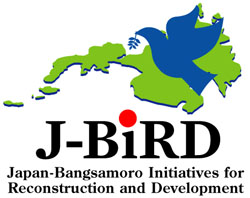
J-BIRD’s objective has been to support the process of peace negotiations between the Philippine government and the MILF by offering assistance in the area of reconstruction and development to the conflict and poverty stricken Bangsamoro. In fact, the Japanese government was the first foreign donor country to formally assist Bangsamoro; moreover, that Japan began its assistance during the peace negotiation process rather than after the peace agreement was something new to Japan.
The amount of Japanese assistance to the conflict-affected areas in Mindnao has reached over 12 billion yen (about US$130 million) in the past 6 years, and one could say that Japan has established a strong relationship based on trust not only with the Philippine government but also with the MILF.
The characteristic of the J-BIRD operation has been that it organically combined three types of assistance, namely: technical cooperation, grant aid and loan aid. This means that: first, under technical cooperation, we conduct field survey to grasp local needs in the conflict-affected area’s target communities; then, according to the results of the field survey, small-scale facilities are built through small grant aid and middle-scale aid or region-specific facilities arranged through loan aid. It is a comprehensive approach. In order to do this, the Japan International Cooperation Agency (JICA), in charge of carrying out the operation on ground, has been sending experts of socio-economic development assistance since 2006 to the International Monitoring Team (IMT) that was establish in 2004 to monitor ceasefire operations. While ensuring safety in conflict-affected areas, JICA staff has been frequenting the area since. In fact, as early as 2002, JICA has been sending its development specialists to assist in human capacity development for the Autonomous Region in Muslim Mindanao (ARMM), working face-to-face with and nurturing the trust from the concerned parties over time in various aspects of technical cooperation projects in the ARMM region.
The peace process between the Philippine government and the MILF did not exactly go smoothly. In August 2008 their trust broke down and armed clashes spread. The IMT had to leave but Japan’s aid policy continued even under this difficult situation. At the end of 2009, the Philippine government and the MILF that resumed the peace talks requested for the assembly of the International Contact Group (ICG), and Japan, together with the United Kingdom (UK), Turkey and four other international NGOs (non-governmental organization) sat as observer to the peace negotiation. It was not only the Philippine government that regarded highly the Japanese assistance thus far who asked Japan to part of the ICG, but the MILF had also requested so. Furthermore, when the meeting between Philippine President Benigno S. Aquino III and Mr Al Haj Murad, Chairman of the Central Committee of MILF took place at Narita (outskirts of Tokyo), MILF was said to have asked for it to be in Japan upon Philippine government request to meet. When the trust between the two parties was breaking down, the result of years of development assistance through the J-BIRD operations and efforts of Japanese staff sent to IMT or ICG to sustain the dialogue between the two parties had contributed to bringing the two back on talking terms.
The prospects for the FAB are that the next three years are a transitional period toward peace in Mindanao. There are many difficult challenges ahead in the next two years, from setting up the Transition Committee, drafting the Bangsamoro Basic Law Bill, and the establishment of the Bangsamoro Transition Authority in place of ARMM.
The Japanese government has expressed the following assistance in the transition period to the Philippine government: (1) assistance toward the consolidation of peace; (2) assistance toward institutional building and human capacity development; and, (3) assistance in regional infrastructure and community development. Already started is the project to assist the MILF’s middle-management human capacity development; last year the training facility was built through the Embassy’s grass-roots grant aid and JICA is offering technical cooperation by running the training programs. In addition, JICA also started this year the human capacity development assistance for MILF’s Bangsamoro Development Agency, and is expanding the size of the target area for operation. Japan is expected to contribute actively to the process of the realization of the FAB by utilizing the experiences from the J-BIRD activities and building on the trust from the two parties.
Kei Fukunaga
28 January 2013
From P’s Pod, vol. I, no 5. March 2013
WHAT IS J-BIRD
As of 12 October 2012
Embassy of Japan in the Philippines
http://www.ph.emb-japan.go.jp/bilateral
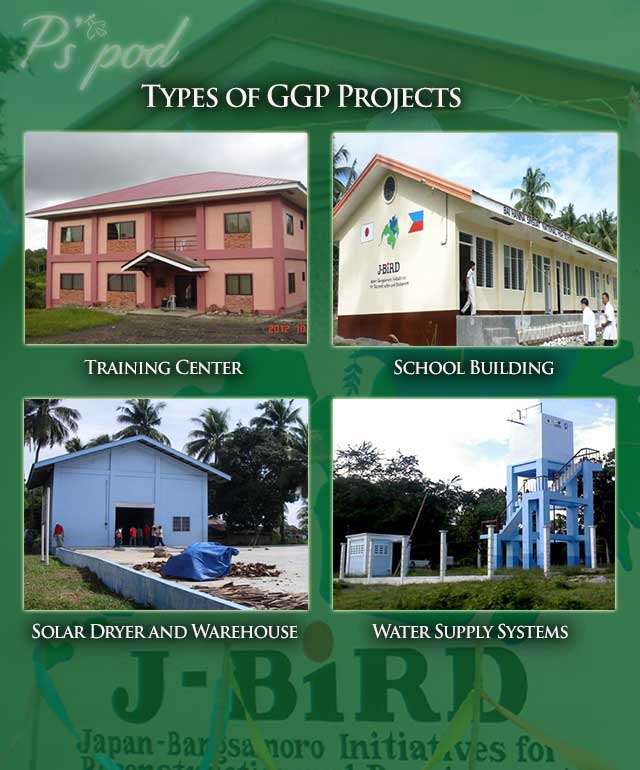
1. J-BIRD
Launched in December 2006, J-BIRD (Japan-Bangsamoro Initiatives for Reconstruction and Development) is designed to contribute to the peace process and development in the Conflict-Affected Areas in Mindanao (CAAM) and the surrounding areas in the ARMM (Autonomous Region in Muslim Mindanao). The objective of J-BIRD is to enable the people and the communities in the target areas to enjoy the “dividends of peace” through the Japanese ODA on the basis of “Human Security” principles. As of now, the total amount of the assistance is approximately JPY12 billion.
・Grant Assistance for Grassroots Human Security Projects (GGP):1. Since the launch of J-BIRD in 2006, Japan has implemented 50 projects in conflict-affected areas in Mindanao, amounting to a total of approximately JPY410 million. 26 projects were implemented in the ARMM.
2. The projects include construction or rehabilitation of school buildings, training centers, water supply systems and agricultural facilities.
2. GRANT AID
1. Since the launch of J-BIRD in 2006, Japan has implemented 50 projects in conflict-affected areas in Mindanao, amounting to a total of approximately JPY410 million. 26 projects were implemented in the ARMM.
2. The projects include construction or rehabilitation of school buildings, training centers, water supply systems and agricultural facilities.
・Grant Aid for Japanese NGO’s project:
1. 1 project (OXFAM-JAPAN) in JFY 2009;
2. 3 projects (OXFAM-JAPAN 1 project and ICAN 2 projects) in JFY 2012.
・Emergency food aid of rice to Internally Displaced Persons (IDPs) through the United Nation’s World Food Program (WFP): JPY860 million (Distribution: Jan. 2009 – Jan. 2010)
3. TECHNICAL COOPERATION
・ARMM Human Capacity Development Project (JPY350 million): This project aims to improve capacity of middle management and operating core members of the ARMM government through the assistance for development of the “Halal Industry”, establishment of the “ARMM Administration Code” and the “Human Resource Information System,” and “Management of Infrastructure”.
・Rice-based Farming System Training and Support for ARMM (JPY85 million), etc.
4. LOAN AID
・This project started in April 2004, co-financed by JICA and the World Bank. Japan’s contribution amounts to JPY2.47 billion.
・CDA (Community Development Assistance) 321 projects (smaller infrastructure projects with 1.5 million peso allotted for each community) and SRI (Strategic Regional Infrastructure) 33 projects (larger infrastructure projects for each province) are being conducted in the ARMM region.
・CDA and SRI projects include construction of multi-purpose centers, water-supply facilities, agricultural facilities, elementary and high schools, and rural roads etc.
・Central Mindanao Road Project (JPY3.7 billion): This project aims to construct roads between North Upi and Kalamansig (74.82km) in Maguindanao Province.
5. NPGA (NON-PROJECT GRANT ASSISTANCE) COUNTER VALUE FUND
1. Construction of Japan-ARMM friendship hall and training center (JPY58 million).
2. Equipment supply for improvement of road network in ARMM (JPY282 million).
3. Personal computers for public high schools project (Phase 4 in Mindanao) (JPY 340 million).
6. OTHER
・This project created the “Socio-Economic Development Plan” (SEDP) for the reconstruction and development of conflict-affected areas based on the comprehensive social survey and need analysis conducted on 3,847 communities.
・The study also implemented 11 QIPs (Quick Impact Projects) and 23 OSAs (On the Spot Assistance). These are small infrastructure projects (e.g., schools, water supply facilities, rice mills) to address immediate needs of the community based on the “In-Depth Barangay Needs Analysis” (IBNA).
・Senior Advisor for Socio-Economic Assistance (SEA) of International Monitoring Team (IMT): Japan dispatches 2 senior advisors who coordinate SEA projects and provides the monitoring of all J-BIRD projects in the IMT Headquarter in Cotabato.
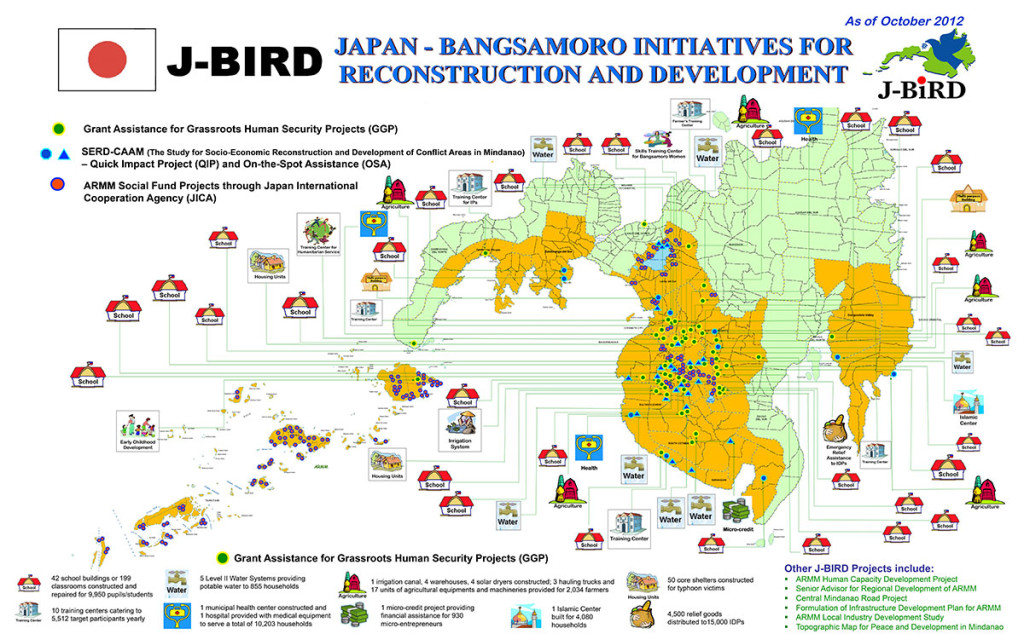
Disclaimer: The views expressed in the articles in P’s Pod are personal views of the authors and do not represent views or positions of particular institutions, organizations, groups or parties, including those of the authors and the universities of P’s Pod editorial team, unless otherwise stated.





